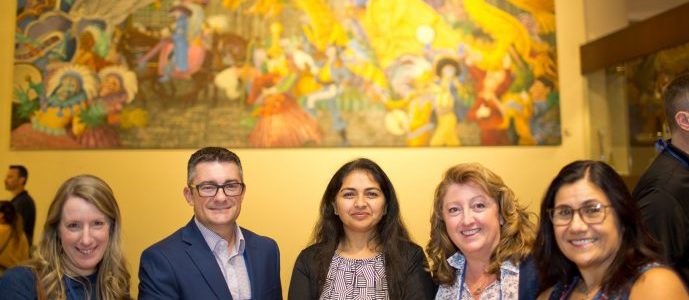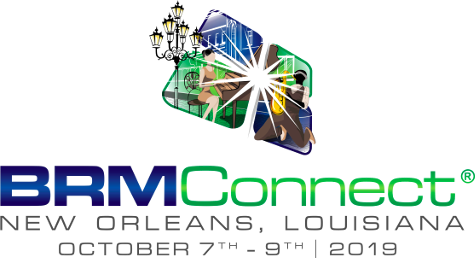Relationships: The Soul of BRM

Our brain is a social organ which thrives on relationships, and it is in desperate need of our attention.
During the opening keynote of BRMConnect 2019 in New Orleans, Danielle Dizes filled in for Danielle Hellebrand, who was unable to present, to deliver a powerful, research-backed presentation that got to the very heart of BRM – Relationships. If you missed it, check out the live recording replay!
The 20-second hug – A Microcosm of the Human Experience
It only takes 20 seconds of hugging another human being to establish trust.
Interestingly, during the first 15 seconds, our bodies are analyzing whether the person embracing us will attack. Only after 20 seconds do our bodies feel enough psychological safety to relax. In doing so, oxytocin is released, a powerful “connection chemical” that readily flows in any safe relationship, which establishes and builds trust between humans.
Oxytocin forms powerful connections across the spectrum, from mothers and their newborn babies, to lifelong best friends… Even to two strangers brave enough to embrace for 20 seconds.
Thus, if we can establish trust from the beginning though simple connection, we should. Alarmingly, we are losing the ability to build necessary trusted connections through epidemics of ambiguous loss and cognitive decline.
Ambiguous Loss and The Hero Complex
Have you ever sat down to dinner with a loved one, eyes locked on your phones, and felt a nagging sense of loss that you just can’t place? That’s ambiguous loss.
Ambiguous loss is loss which occurs without a clear understanding of what we are actually missing. It can even be felt when somebody else is present, like when we reach for own phones first thing in the morning even before telling our partner “hello”. This loss is scientifically linked to higher rates of depression, heart disease, and even cancer.
Correspondingly, the Hero Complex refers to our social praise of the idea that “the busier we are at work, the more value we are contributing.” As a result of overstimulation in a fast-paced world, our brains are constantly overworked which leads to cognitive decline. In fact, our cultural IQ decreased by 15 points because of this unhealthy environment.
Restful Silence and Trusted Connections Will Cure our Cognitive Decline.
The science in Danielle’s presentation proves this:
- Mirrorneurons, also known as “empathy neurons”, are neurons in the brain that automatically reflect the emotion we see in others. When others are visibly stressed, mirrorneurons do their job and automatically cause our bodies to mirror stressful body language and behaviors.
- For every negative thought we have, it takes 3-5 positive thoughts to reverse the negative effects, even though we tend to remember positive experiences more.
- Investment in employee purpose and well-being has a direct positive correlation with organizational performance.
- Data studies from across the world show that our brains need silence, rest, and time to recover, and human society is trending in the opposite direction.
We live in a rapid-pace world where ideas are the currency of the 21st century. However, if we are stressed, as the data overwhelmingly shows, we experience cognitive decline and our currency of ideas runs low. Consequently, the best things we can do for ourselves include giving our brains necessary rest and building trusted connections.
As BRMs and human beings, we can accomplish this by building relationships both with the self and with others.
The best way to build a good We is to create a healthy Me.
We cannot hope to build trust with others until we first take care of ourselves. Start by taking 3 minutes each day during active hours to find a quiet space. In that space, allow yourself to breathe, meditate, and simply let the mind wander. Most often, our best “a-ha” moments are found in unstructured silence.
“If you want to go fast, go alone. If you want to go far, go together.”
If mirrorneurons cause us to reflect the emotions we see in others, then the following is also true; people unconsciously imitate what they see in us. In other words, what you are exuding from yourself will be reflected back at you.
Correspondingly, if the Wi-Fi signal we are sending out into the world is negative, then negativity will spread through all those who receive the signal.
On the contrary, if we actively seek to build trust and connections through positive energy, then those positive connections will emanate and cover the planet with empathy, shared purpose, and trust.
Cognitive science demonstrates that energies are contagious. When people feel happy, inspired, and satisfied with how they spend their time; productivity and value are natural outputs. Thus, when positive energies spread through authentic relationships, value is likewise generated and multiplied.
To learn more about building trust among teams through authentic relationships, take some time to read up on Relationshipism which was formally introduced today at BRMConnect 2019!
Worried about missing out? Our two upcoming Keynote sessions are available through livestreaming!
